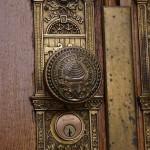
Continued from LDS Boundaries: Who’s In, Who’s Out?
PATRICK Q. MASON, Chair of Mormon Studies at Claremont Graduate University: John, this clearly hits pretty close to home, given your experiences over the past few years. I haven’t been in your position — not just in terms of the excommunication, but also the serious doubts about core LDS doctrines — so it’s hard for me to walk in your shoes. But I certainly sympathize with the confusion, pain, and loss you’ve felt, and appreciate your willingness to speak openly about some pretty hard things.
Let me respond to just a few points, and then I agree that we should continue this very important conversation in future exchanges.
I wasn’t really trying to suggest a decline of the importance of doctrine in contemporary Mormonism. Many of the doctrines have changed over time, either in substance or emphasis, but the fact remains that doctrine is still central to how LDS Mormonism is defined and experienced, both for church leaders and laity. That the church does not have formal mechanisms — including the temple recommend interview — to patrol the contents of a person’s private belief does not mean the church doesn’t care, quite deeply, about doctrinal purity.
One thing I appreciated about your response is how you pointed out that doctrine is often wonderfully uplifting, edifying, and healing. (The word has the same root as “doctor,” so it should be healing!) I for one love the doctrines that all human beings are spirit daughters and sons of God, that we have a Heavenly Mother as well as Father, that family relationships are eternal, that every human being is an uncreated intelligence that has the potential to become a goddess or god, that the universe is predicated on love and persuasion rather than compulsion, and many others that are unique to Mormonism.
To be sure, over the course of our history we’ve also embraced some less than stellar doctrines, and I’m grateful to see that many of those have found their way to the scrap pile, though many hung around well beyond their expiration date (and some should have never arisen in the first place). Because of our finite minds and limited perspective, one of the hardest things to determine at any particular point of time is which doctrines really matter and which are expendable. In the 1880s church leaders and members were certain that plural marriage was essential — until they learned a decade later that it wasn’t. I suppose my training as a religious historian gives me a little bit of perspective and patience about these things — the same thing has happened in every other religion, so I’m not surprised to see it happening within Mormonism. Over time we have continued to discern and develop our core doctrines, leaving some of the extraneous things to come and go. So the atonement of Jesus Christ remains, but Adam-God does not. The first half of D&C 132 survives while the second half gets shelved. (I know, it’s more complicated than that; I’ve read and really like Carol Lynn Pearson’s new book. If we want to get into polygamy, we can later.)
So I don’t want to devalue doctrine in general — I believe there has to be real content to our religion. Ideas matter, and good ideas can have positive effects in the world. Of course, the opposite is true as well.
The question of conscience vs. speech is an absolutely crucial one to discuss and deserves its own full treatment. I’m going to propose we save it for a later post, if that’s okay. I don’t fully agree with claims that the church governs through fear, intimidation, and silencing — personally, I feel none of those things. The Mormon culture I participate in, both intellectually and devotionally, is not toxic, stultifying, or pathological. To the contrary, Mormonism provides both healthy grounding for my daily life as well as an aspirational (and inspirational) vision for who I want to become.
At the same time, we have to recognize the heavy price that many, including you, have paid for public opposition to church teachings. It seems clear to me that we’ve never quite figured out where the line is between allowing for freedom of conscience (which I think the church is quite serious about) versus policing the boundaries and maintaining purity of doctrine (which the church is also quite serious about). Freedom and surveillance are dueling impulses of the modern age, which also find full expression in the modern LDS Church.
Finally, I think it’s a wonderful question — what did Joseph Smith live and die for? I would argue that he didn’t live and die for Zelph the Lamanite, and not even for plural marriage (though that was certainly a contributing factor to his eventual murder). I think he lived and died because he had a vision of humanity reaching up to God and God reaching down to humanity. Bringing heaven and earth together had radical implications — not just theologically, but also politically, economically, socially, and familially.
Joseph wanted to bind the human family together through the redemption of Jesus Christ, and to build a godly society called Zion. In retrospect I personally believe he made some miscalculations as to how those two things could or should be accomplished. For instance, I have deep misgivings about plural marriage in Nauvoo (and beyond), and the militarism that developed in Missouri and then Nauvoo, and some of his more theocratic leanings.
But the vision of binding the human family together through the redemption of Jesus Christ, and building a godly society of justice, peace, love, and righteousness called Zion? That’s a vision I’ve voluntarily covenanted to live and die for too. And that’s a vision I find myself working for within Mormonism, which is one of the things that continue to anchor me in this graced community.
JOHN P. DEHLIN, CEO of the Open Stories Foundation, founder of Mormon Stories Podcast: As always, you offer such a gracious and thoughtful response, Patrick.
I too have drunk deeply from the well of the joy and grace of Mormonism, so I understand your deep ties and devotion to it. While it is true that my family and I are profoundly happier and healthier than ever before after leaving Mormonism — and this is true for perhaps the majority of post-Mormons that I meet — there are certainly times still when I deeply miss the fellowships of the “saints,” my former tribe. So many good people there. Such a lovely faith tradition in so many ways. No doubt.
I respectfully but completely disagree with you when you say that the Mormon church does “not have formal mechanisms … to patrol the contents of a person’s private belief.” As you know, the mechanism that the Mormon church uses for thought patrol is called the ecclesiastical interview (including interviews with branch presidents, bishops, stake presidents, or mission presidents), which in my experience is often wielded bluntly on a weekly basis across the globe within modern Mormonism. Again, for a word-for-word example of such an inquisition, I refer readers to this transcript of my own interactions with my stake president. The Mormon church was meticulously monitoring my public statements in an almost KGB-like manner and demanded that I either go silent, or be excommunicated. Spoiler alert: I gladly chose the latter as a matter of conscience.
Less someone claim that my experience was an exception, I would refer them to the video-recorded excommunication of Jeremy Runnells, author of CES Letter, as well as the many accounts of modern excommunications recounted on Mormon Stories podcast, including those of Jake and Amy Malouf, Clay Christensen, Elizabeth Grimshaw, Rock Waterman, Marisa and Carson Calderwood, Brent Metcalfe, former U.K. bishop Stephen Bloor, and Kate Kelly (to name only a small handful of examples — many, many more exist).
You need but spend an hour on the exmormon reddit, pretty much any day of the year, to get in touch with how questioning, doubting, and disbelieving members are often policed, intimidated, publicly shamed, and occasionally excommunicated for openly expressing their doubts and disbelief. Whether the “punishment” comes through denying one’s ability take the sacrament, the denial of a father’s ability to baptize or confirm the priesthood upon their son, the denial of a mother’s ability to attend the wedding of her own daughter, the guilt, shaming, and/or demotion of a missionary after admitting to masturbation, or simply the public shaming brought on by the congregational “gossip” that so often follows a supposedly confidential interview with a bishop — the use of coercion, intimidation, and excommunication for improper thoughts, beliefs, behavior, or doubts is very much alive within 21st century Mormonism.
And this treatment doesn’t even include the punishment that most Mormon doubters endure: the pain of being forced to remain silent, and to “push down” what one thinks or feels out of fear, while the orthodox members feel completely free to say whatever they want on Sunday (e.g., “Trump is a gift from God!” “LGBT people are a sign of wickedness!”). This coerced silence — week in, and week out — is perhaps the most psychologically destructive of punishments meted out to doubting or disbelieving Mormons.
Perhaps this is why so many struggling Mormons that I know deeply identify with the new A&E program Leah Remini: Scientology and the Aftermath. While no one that I know views Mormonism as identical to Scientology in terms of control, coercion, and abuse, I would say that tens of thousands of doubting and disbelieving Mormons feel as though their experiences with modern Mormonism are much more akin to those those of a disaffected Scientologist than to what you so beautifully express above.
To close with a bit of hope, I would very much grant to you that the climate for openness and dissent within Mormonism is much, much better than it was 30 or 50 years ago. I would only add that this improved climate is in many ways due to the sacrifices made by many open, public dissenters, from B.H. Roberts, to Leonard Arrington, to Sandra Tanner, to the September 6, to Jeremy Runnells, Simon Southerton, and Grant Palmer today — all of whom paid very deep personal prices for their authenticity within their Mormon congregations.
Yes the Mormon church has come a long way, but I would argue that it still has a very, very long way to go, and I believe that it is essential for us to not (out of a sense of optimism or privilege) gloss over the very real damage and pain that continues to be inflicted upon doubting or disbelieving Mormons today. In 2017.
As always, a very sincere thanks, Patrick, for your willingness to discuss and explore such difficult topics. You are a credit to your faith – and I hope that they cherish you as a member. You deserve it.
Patrick: Although the suggestion that the LDS Church works “almost” like the KGB rubs me the wrong way, and runs quite contrary to the spirit of loving ministry I’ve seen displayed by most church leaders on the local and general level, I also don’t want to trivialize or dismiss the real experiences that you and many others have gone through as you developed and then expressed doubt and dissent. I went too far in saying that the church has no formal mechanism to patrol private belief, although I do maintain that it is possible to hold any number of private heterodoxies that are never asked about in ecclesiastical interviews. In many cases — probably far more than the cases of formal discipline — there is something of a “don’t ask, don’t tell” quality to private doubt in contemporary Mormonism. Whether or not that’s healthy can be the subject of another conversation.
One thing we may also want to discuss in the future is the relationship of private doubt and public dissent, and what we should reasonably expect from an organization that claims to be the Church of Jesus Christ. On a related note, what’s the difference between B. H. Roberts and Juanita Brooks on the one hand, and the long list of people you cited above who were excommunicated? How do some people manage their doubt and even dissent while staying within the church (even if they pay some kind of price for their heterodoxy), while other people either feel compelled to walk away or receive some form of official ecclesiastical discipline?
Thanks for (re-)starting this lively conversation, John.










